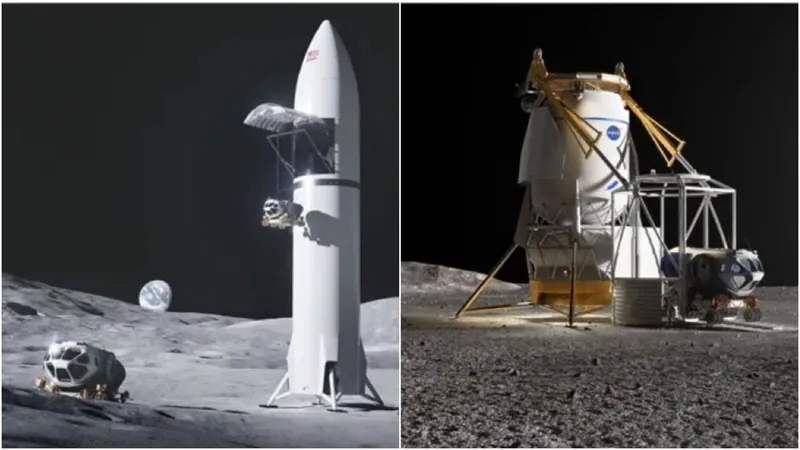
NASA Partners with SpaceX and Blue Origin for Groundbreaking Moon Missions!
2024-11-21
Author: Emily
NASA is ramping up its efforts in the Artemis program by enlisting SpaceX and Blue Origin to spearhead demonstration missions aimed at returning astronauts to the lunar surface. The agency has granted both companies contracts under its Human Landing System initiative, which underscores its commitment to establishing a presence on the Moon and pushing the boundaries of space exploration.
The recent announcement confirms that both companies are well into the design phases of their lunar landers, preparing to put these innovations to the test through crucial qualification missions designated to transport substantial cargo to the moon. This strategic move comes in response to NASA's call for new cargo variants of the lunar landers, aimed at bolstering mission flexibility and enhancing the delivery of crewed and cargo expeditions.
Stephen D. Creech, NASA's assistant deputy associate administrator for technical programs at the Moon to Mars Program Office, elaborated that the utilization of two distinct lunar landing systems will promote a steady stream of moon landings, facilitating ongoing scientific research and exploration opportunities. He emphasized the significance of these plans in maintaining a continuous human presence on the moon throughout the coming decade.
As part of this initiative, SpaceX has been tasked with developing a pressurized rover, while Blue Origin will focus on creating a lunar habitat. The pressurized rover is a product of collaboration with the Japan Aerospace Exploration Agency (JAXA), with anticipations of launching in 2032 to support missions beyond Artemis 6. Meanwhile, Blue Origin's lunar habitat is expected to be ready for deployment in 2033.
The Artemis Program's overarching goal is to return astronauts to the Moon for the first time since the Apollo missions concluded in the 1970s. The targeted lunar south pole is of particular interest due to abundant water-ice reserves that could be pivotal for sustaining a lunar outpost and even creating rocket fuel.
This ambitious lunar endeavor is not merely a destination but a stepping stone for future Martian missions. While the Artemis aspirational program looks farther into the cosmos, NASA acknowledges a substantial amount of work lies ahead before setting sights on the Red Planet.
Following the successful uncrewed Artemis 1 mission in November 2022, NASA's Space Launch System (SLS) rocket and Orion spacecraft have marked significant progress in lunar exploration. The upcoming Artemis 2 mission aims to take four astronauts on a lunar orbital journey, initially slated for late 2024 but now rescheduled to the end of 2025. Consequently, the much-anticipated Artemis 3, which will mark the program's first crewed moon landing, has also been pushed to 2026.
Exciting times lie ahead in lunar exploration as NASA, SpaceX, and Blue Origin prepare to redefine humanity's journey beyond Earth!









 Brasil (PT)
Brasil (PT)
 Canada (EN)
Canada (EN)
 Chile (ES)
Chile (ES)
 España (ES)
España (ES)
 France (FR)
France (FR)
 Hong Kong (EN)
Hong Kong (EN)
 Italia (IT)
Italia (IT)
 日本 (JA)
日本 (JA)
 Magyarország (HU)
Magyarország (HU)
 Norge (NO)
Norge (NO)
 Polska (PL)
Polska (PL)
 Schweiz (DE)
Schweiz (DE)
 Singapore (EN)
Singapore (EN)
 Sverige (SV)
Sverige (SV)
 Suomi (FI)
Suomi (FI)
 Türkiye (TR)
Türkiye (TR)